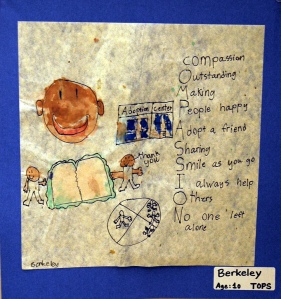Admit something:
Everyone you see, you say to them,
“Love me.”
Of course you do not do this out loud,
Otherwise,
Someone would call the cops.
Still though, think about this,
This great pull in us to connect.
Why not become the one
Who lives with a full moon in each eye
That is always saying
With that sweet moon
Language,
What every other eye in this world
Is dying to
Hear?
-Hafez, “With That Moon Language”
Two summers ago, I had a creative writing class where only a few students wanted to share their work. The atmosphere in the classroom wasn’t helping out; although all of the students were in middle school, the more vocal students also happened to be the more sophisticated and socially-aware students, and their confidence intimidated the other students who hadn’t gotten there yet. Towards the end of the first week of our three week course, some students were starting to shut down, writing very little and stopping well short of what I’d consider a good effort from them. I was desperate to change the mood. After hearing the beginning of a powerful essay a student in another writing class wrote, I took the first line gave it to my students as the following writing prompt: “The thing you don’t get about me is ….” Nearly every student started in immediately, and most of them wrote for much longer than they had on any other previous assignment, well past the time when they would ordinarily go out for break.
When the time arrived that we’d normally share the posts, I was anxious of how it would go, especially having already seen the personal nature of some of the essays. When I asked for volunteers, more of the class wanted to share than I anticipated. Some of them seemed even desperate to share. The essays they wrote talked about not feeling worthy of being in a camp for gifted students, about being teased for being the smartest kid in class, about the pressures they felt to succeed, about the confusing nature of friends who acted insensitively. Eventually, all of the students shared; most of the students wanted to read and needed little prompting. Those who were hesitant at the start received encouragement and support from their peers, and the more they heard stories of the struggles of their classmates, the more that they recognized this was a safe place where they could bring some of those things they felt embarrassed or confused about into the light. They saw the truth in Hafez’s command to “Admit something: everyone you see, you say to them, “Love me.” They felt exhilarated that his premonition that speaking from such a vulnerable place did not result in “someone call[ing] the cops.” The experience was its own reward. They loved the feeling of having these experiences exposed to the open air and the acceptance they felt when others did not judge them. The exercise changed the feel of the class. I was so proud, not only for the courage they showed, but also because they treated their classmates with empathy. More than that, they acted with compassion. Continue reading ‘Compassion and teaching: Part 5 of Five years, five lessons in five words’




